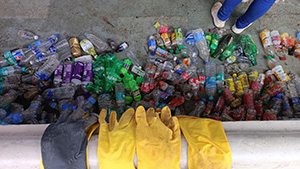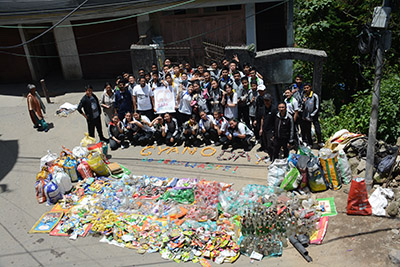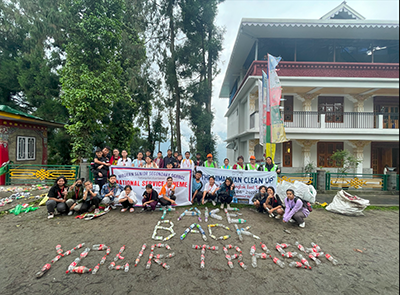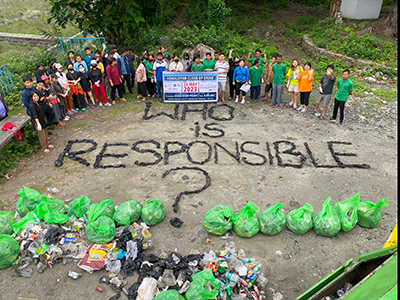Shimla/Gangtok- The pristine Himalayan region is now under severe threat from an escalating trash crisis. Startling data released by The Himalayan Cleanup 2023 (THC) has exposed the top 20 companies responsible for polluting this fragile ecosystem.
The audit results are out: Will the state governments in Himalayan states wake up: Urgent action is now required to combat this escalating crisis before the things go to a point of no return.
Led by 11,000 dedicated volunteers across 10 mountain states, THC embarked on a massive cleanup effort, targeting over 350 sites and conducting waste and brand audits.
The results are alarming. Volunteers collected a staggering 117,187 units of waste, of which a shocking 92.8% (108,799 units) consisted of plastic.
The majority of the plastic waste- 77.1%- was non-recyclable, primarily consisting of multilayered plastics and tetra packs.
The brand audit conducted by THC identified the major culprits behind this environmental catastrophe.
Among the top polluting companies in the Indian Himalayan Region are industry giants. Toping the list are PepsiCo India, Perfetti Van Melle, Parle, CG Foods India Pvt. Ltd., ITC, Hindustan Coca Cola, Nestle, Tej Ram Dharam Pal Pvt. Ltd., Mondelez India Food Pvt. Ltd., GCMMF (Amul), Hindustan Unilever Ltd., Britannia Industries Ltd., Trimurti Fragrances, Guptaji Food Products, Vadilal Enterprises, Dabur India Ltd, Zeenat Ice Cream, Paras Surti Product Pvt Ltd., Godfrey Phillips, and Haldiram's Snacks Pvt. Ltd, revealed the report accessed by HimbuMail.
What is shocking is burden of cleaning up the mess created by these companies has been unfairly placed on consumers and waste managers alone.
The Himalayan Cleanup now demands a radical shift in the narrative.
It is time for these companies to take full responsibility for the waste they generate and actively work towards designing waste out of their products and processes at a systemic level.
The Himalayan Cleanup, an annual event initiated in 2018, is a joint effort by Integrated Mountain Initiative and Zero Waste Himalaya.
Its primary objective is to shed light on the waste crisis in the Himalaya, advocating for mountain-sensitive policies and practices.
Under the theme "Reflect, Switch and Demand," the 2023 edition of THC aimed to motivate participants to reflect on their contributions to the waste crisis, adopt sustainable lifestyles, and unite their voices against plastic pollution.
Mountains, once considered pristine and untouched, are now inundated with non-recyclable plastics. These plastics have no viable solutions and are left to litter the mountain landscapes, choke waterways, and fill up already strained landfill sites.
Waste managers face an uphill battle as these unmanageable plastics continue to exacerbate the waste crisis in the region.
The THC data highlights a distressing intersection between food consumption and waste generation.
An alarming 81.8% of all plastic waste collected during the cleanup consisted of packaged food and drinks.
What is worrisome is that this trend is being consistently observed since the inception of THC in 2018.
It reflects the growing prevalence of junk and processed foods that are rapidly replacing the diverse local food cultures of the Himalaya that in turn can unleash a tornado of health problems for natives.
These nutritionally deficient products, high in salt, sugar, and fat, contribute to the alarming rise of non-communicable lifestyle diseases in the region.
Even before their packaging is discarded, these products pose a threat to the well-being of communities.
A staggering 73% of food packaging collected was non-recyclable multilayered plastic, underscoring the urgent need for a shift in eating habits to combat the waste crisis.
Of particular concern is the surge in the popularity of Sting, an energy drink, which accounted for 22% of the plastic waste collected in 2023, doubling from the previous year.
Disturbingly, the product itself carries a warning label stating that it is "not recommended for children, pregnant, or lactating mothers."
Furthermore, there has been a decline in single-use plastic waste from 7.4% in 2022 to 2.3% this year, indicating a positive shift in consumer behaviour.
The journey of THC from 2018 to 2023 serves as a stark reminder of the relentless onslaught of plastic waste in the Himalayas.
Urgent and coordinated action is now paramount at both individual and institutional levels to address this crisis.
The Himalayan Cleanup calls on individuals to reduce waste and adopt mindful consumption practices.
It emphasizes the critical need to integrate issues of food and nutrition security and the climate crisis into waste management narratives for sustainable solutions.
Waste management in mountainous regions poses unique challenges that demand adequate resource allocation and mountain-sensitive policies.
THC's resounding message is clear: companies must cease polluting the Himalayas, and collective action is necessary to preserve this invaluable natural treasure for generations to come.











